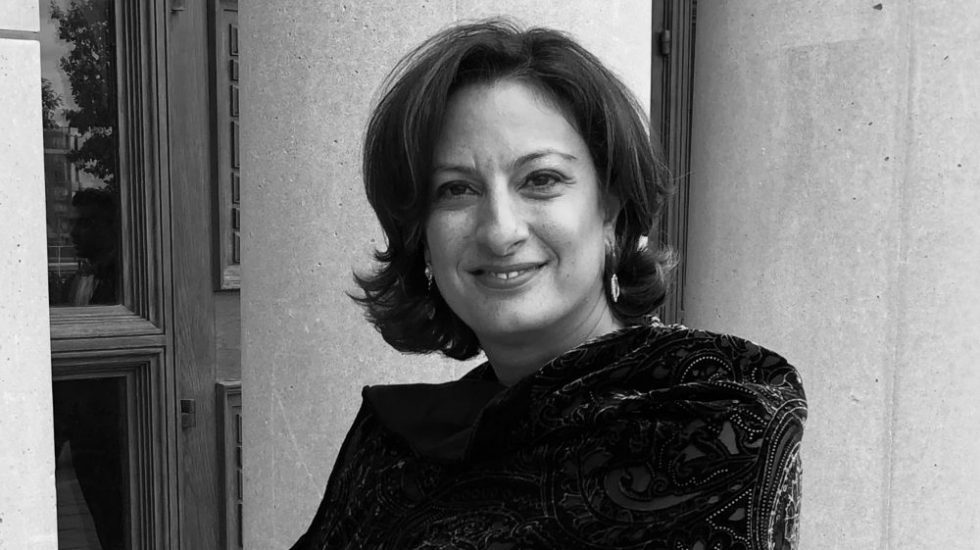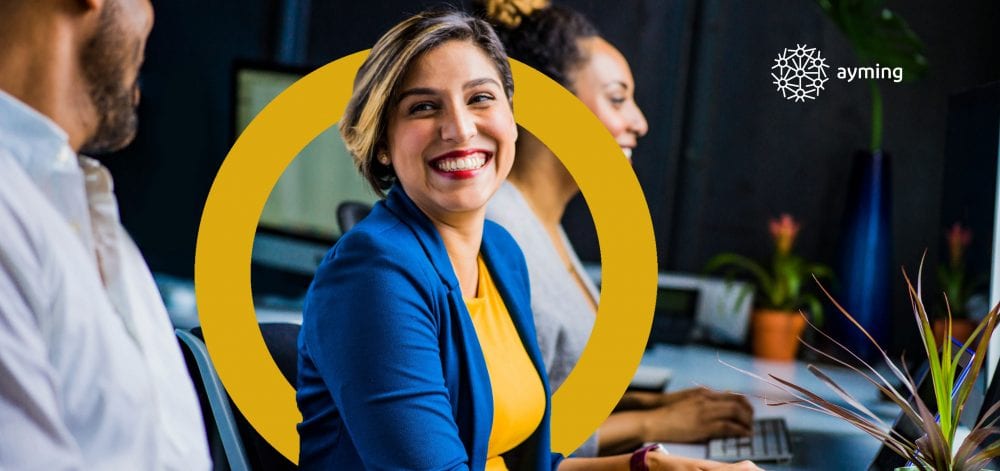
Engineering a Self-Transformation
As an electrical engineer, Heba’s career journey took her from Egypt to Canada, and from the automotive industry to ‘self-transformation’ at Ayming Canada. The Director of Operations Performance talks to us about soft skills, sales and the self-confidence challenges many women face in their careers.
We sat down with Heba to find out more about her personal and professional journey which formed her career as a successful business woman in the STEM field.
When did you become interested in engineering?
I always wanted to be an engineer ever since I was able to read and write. I was inspired by my family – we’re all engineers: my mother, father and grandfather were engineers, and also my sister, and our husbands.
Did your career choice prove challenging as a woman?
I worked in male-dominated industries, such as automotive, and in the Middle East, where a female engineer with assertive opinions was not very welcome. But I learned quickly how to work with people at all levels and how to motivate them to cooperate with me and look beyond my gender. I never accepted there was a barrier because of my gender.
Are there still obstacles making it harder for women to succeed in engineering?
The auto industry is very tough. In the Middle East where there were also cultural barriers. I aspired always to go and work in the field, but I was told no, that wasn’t for women. Barriers are melting in male-dominated industries, but it depends on where you are in the world. And it’s not that easy for a woman succeed and advance to the highest levels.
Are there misconceptions that put young girls off engineering?
I really don’t think so. Of course, I have two boys, not girls. But I think it’s to do with tendencies and interests, and what young people want to study. You either like it or you don’t, and if you like it, you’re going to follow your dream and make it happen. I’m a firm believer that if you want something badly enough, and believe in yourself, you’re going to do it, no matter what.
How have you balanced work and family?
I started my first job in Canada while I had one kid and was pregnant with the other. And I was working full-time, while I was preparing for the professional engineers exam. As a quality engineer I was responsible for a component testing that was worth $200,000; any failure would have jeopardized launch day with the OEM, which is unheard of. For that reason, I had to be on call and on site immediately should a failure occur to avoid any delays. During the launch of a new product, sometimes I had to work 17-18 hours almost continuously. So it was a very tough environment for a mother of a young child. But if you want it badly enough, you’re going to put the hard work in.
How is that balance in your current role?
Ayming is a great place to work because they are very understanding of working moms. And as a manager, when employees with young kids ask to work certain hours, I’m very accepting, because I went through it myself. So Ayming very much so embraces mothers with young children. Their flexible working hours and working from home policies definitely help mothers with families. In the auto industry you cannot run the plant or a launch a product from home. Consulting is hard work too, but at least you can work from home, put your kids to bed, and then still work and finish what you have to do. Ayming has been the most amazing place to work from that point of view.
What else can employers do to help?
Leadership is also important. Trusting your employees – that they do the work they have to do whether they are sitting in the office or at home. This flexibility and understanding give you peace of mind: because if you’re stressed over your kid being sick, you can’t focus on the work you have to do. So definitely, it’s a step forward to empower employees and make them feel trusted and valued.
Why did you switch to consulting?
I didn’t make the decision consciously, it was an opportunity that came to me, and when I started, I loved it. In 2009 there was a meltdown in the auto industry and I lost my job in the recession. One of my ex-colleagues who had left, reached out to me and explained what Ayming does. I was so excited about the change, even the aspect – as silly as it sounds – that I could wear what I want and wouldn’t have to be on the plant floor holding greasy parts all day long, wearing safety shoes and safety glasses. Becoming a Consultant was a big move, but I loved the work so much, and wanted to grow and gain new skills.
You had transferable skills from engineering?
It was good for my job that I’d worked as an engineer and in industry, because what we do is help companies with their R&D tax credits. I could relate to what they were telling me. But as a mom with young kids in the auto industry, I had no time to network, make friends, develop soft skills. I wasn’t used to talking and communicating with clients. When I went to my first client meeting I had the worst headache ever because I was so stressed. But I recognized I didn’t have those soft skills and I worked at it very hard. Now I’m the one dealing with our biggest clients in Canada because of the skill-sets I’ve developed. It’s a complete transformation.
How did you achieve this?
The first step is to recognize what you’re missing and want to improve. In every meeting I observed how my superiors were behaving. So it was self-build, and I had great mentors along the way. They helped me, they were kind, their constructive criticism wasn’t harsh, it was encouraging me to grow and I owe where I am today to everyone I worked with. If you saw me 10 years ago you wouldn’t think I was the same person I am now.
What is the Ayming culture like?
We’re like a family. I joke about it when somebody starts: We come with all the baggage of a family! But really, it’s very welcoming, a very friendly environment, and that helps someone integrate and grow skills. We watch out for each other and help new people grow, because you’re as weak as the weakest team member. So as you help everyone in your team to grow you become a stronger team. That’s how I feel about Ayming.
What’s most satisfying about your work?
I love my clients, so when I meet with a client who is happy with Ayming’s services and providing referrals to us, that’s the most satisfying feeling ever. The second thing for me – which is a new achievement – is sales. I’ve always been a consultant and working in delivery, until I was challenged two years ago. I could never imagine I would sell anything in my life. I despised the stereotypical hard sell. But I truly believe in our product, what we’re doing and how much it can help any business – especially a growing business. That’s changed how I look at selling. And now I love it. This is a new skill. It’s eye-opening what you can do when you decide that you want to do it.
What, if anything, holds women back?
The one issue I do see in women I work with is self-confidence. Sometimes they are the smartest people with a lot of knowledge and experience, and they just don’t have that self-belief. Especially young women with kids, their self-confidence goes down, and I personally went through it. No matter how many times I tell them: ‘You know what you’re doing, you’re so smart, you do a great job, just project self-confidence.’ It’s what makes the difference when you’re in front of a client. Sometimes they feel they have to work twice as hard as other people to prove they’re equal. And it breaks my heart if, because of a lack of self-confidence, women don’t progress as they should.
What can be done to address this?
The culture in Ayming of encouragement helps for sure. I recognize it and try to help people around me. It’s the responsibility of everyone. And it’s the woman’s responsibility to recognize it and work on it too. It’s so personal. I’m not sure what else we can do from an HR point of view, other than the mentors we have, who encourage, push and help you to build that confidence.
Some argue there are advantages, at work, that come from being a mother?
I agree wholeheartedly. Being a mother makes you more compassionate and understanding. I have a son who has ADHD, and sometimes I think this experience helps me when dealing with individuals in a team and keeping them focused. Being a mother also affects your time management – you become the most efficient person in the universe because you’re used to juggling a hundred things. And you give people the benefit of the doubt. This is an acquired skill for me. I’ve found it goes a long way when you always try to see the positive in any situation. It makes a huge difference.





